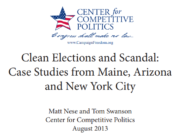| Subgrades | |
| Covered Speech: | A+ |
| Anti-SLAPP Procedures: | A |
| Subscores | |
| Covered Speech: | 100 out of 100 points |
| Anti-SLAPP Procedures: | 97 out of 100 points |
| Detailed Scoring on Anti-SLAPP Procedures | |
| Suspension of Court Proceedings Upon an Anti-SLAPP Motion: | 20 of 20 points |
| Burden of Proof on Plaintiff to Defeat an Anti-SLAPP Motion: | 12 of 12 points |
| Right to an Immediate Appeal: | 25 of 25 points |
| Award of Costs and Attorney Fees: | 40 of 40 points |
| Expansive Statutory Interpretation Instruction to Courts: | 0 of 3 points |
State Anti-SLAPP Statute
New York State’s anti-SLAPP statute[1] protects any communication in a place open to the public or a public forum in connection with an issue of public interest. It also protects lawful conduct that furthers either the exercise of free speech in connection with an issue of public interest or the exercise of the right of petition. The scope of the statute was broadened in late 2020, making a significant portion of caselaw that had interpreted its previous iteration largely irrelevant. Although discovery, pending hearings, and motions are stayed once an anti-SLAPP motion is filed, a court may nonetheless order limited discovery to be conducted if the respondent shows that the stay prevents the presentation of essential facts. To prevail against an anti-SLAPP motion, the respondent must show either that the action has a substantial basis in fact and law or that it is supported by a substantial argument for an extension, modification, or reversal of existing law. Although the statute itself does not provide for the interlocutory appeal of a decision on an anti-SLAPP motion, another provision of New York law guarantees a general right to such an appeal.[2] The court must award costs and attorney fees to the prevailing party if it finds that the action commenced or continued without a substantial basis in fact and law and could not be supported by a substantial argument for the extension, modification, or reversal of existing law; other compensatory and punitive damages are allowed if the court finds additional aggravating circumstances.
[1] N.Y. Civ. Rights Law § 70-a and § 76-a; see also NY CPLR Rule 3211.













